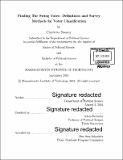Finding the swing voter : definitions and survey methods for voter classification
Author(s)
Swasey, Charlotte (Charlotte A.)
DownloadFull printable version (2.440Mb)
Other Contributors
Massachusetts Institute of Technology. Department of Political Science.
Advisor
Adam Berinsky.
Terms of use
Metadata
Show full item recordAbstract
This thesis proposes a theory mapping emotional reactions to political information onto a theory of vote decisionmaking and then further onto measurable survey response. Using on-line processing based in emotion, voters form affective summaries about candidates, which store previous information as an emotional response. The act of voting is treated as a single realization of a probabilistic event, with the relative probabilities of each vote option being an expression of the affective summary. These summaries are expressed as warmness or feeling towards each candidate, which can be captured using the ANES Feeling Thermometer scales. A metric of the difference between the scores given to the Republican and Democratic candidates is used, based in the work of William Mayer. This metric suffers from significant survey error, but is related to party ID and expressed vote choice, as well as demographic factors and perceived efficacy. Feeling thermometer responses are found to carry meaningful information about a respondent's relationship to the election and candidate preference.
Description
Thesis: S.M., Massachusetts Institute of Technology, Department of Political Science, 2016. Thesis: S.B., Massachusetts Institute of Technology, Department of Political Science, 2016. Cataloged from PDF version of thesis. Includes bibliographical references (pages 43-48).
Date issued
2016Department
Massachusetts Institute of Technology. Department of Political SciencePublisher
Massachusetts Institute of Technology
Keywords
Political Science.